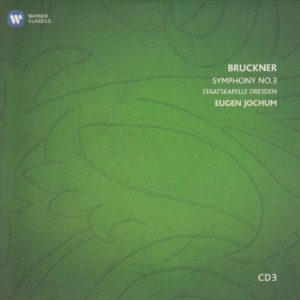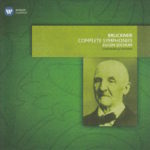 This morning’s conductor of Anton Bruckner’s Symphony No. 3 in D Minor (WAB 103), nicknamed “Wagner,” is German-born Eugen Jochum (1902-1987), unarguably one of the most highly respected interpreters of Anton Bruckner’s music who ever lived.
This morning’s conductor of Anton Bruckner’s Symphony No. 3 in D Minor (WAB 103), nicknamed “Wagner,” is German-born Eugen Jochum (1902-1987), unarguably one of the most highly respected interpreters of Anton Bruckner’s music who ever lived.
The orchestra is the Staatskapelle Dresden.
I encountered Mr. Jochum five times before in my 144-day journey: on Day 6, Day 7, Day 23, Day 22, and yesterday (Day 38).
 The real question for me today is this: Will this Jochum interpretation sound better than yesterday’s? The same as? Worse than? Will it grab me by the lapels and make me listen to it?
The real question for me today is this: Will this Jochum interpretation sound better than yesterday’s? The same as? Worse than? Will it grab me by the lapels and make me listen to it?
Before I dive into the subjective, I first have to address the objective – what I’ve been calling the nuts and bolts.
Bruckner’s Symphony No. 3 in D Minor, composed in 1873
The version Jochum used is the 1889 version, edited by Nowak
Eugen Jochum conducts
Staatskapelle Dresden plays
The symphony clocks in at 54:34
This was recorded in January (I think) of 1977 in Dresden, Germany
Jochum was 75 when he conducted it
Bruckner was 49 when he composed it
This recording was released on the Warner Classics Record Label
Bruckner wrote his symphonies in four parts. The time breakdown of this one (Symphony No. 3 in D Minor, 1877/78 Nowak version), from this particular conductor (Jochum) and this particular orchestra (Symphonieorchester des Bayerischen Rundfunks) is as follows:
Moderato (Mehr langsam, misterioso, officially)………………………….20:51
Adagio (Bewegt, quasi Andante, officially)…………………………………….15:39
Scherzo…………………………………………………………………………………………….7:41
Finale………………………………………………………………………………………………11:03
Total: 54:34
Okay. Now for the subjective stuff…
My Rating:
Recording quality: 4 (seems a little flat)
Overall musicianship: 4
CD liner notes: 3 (two short essays translated into English, German, and French, scant little else)
How does this make me feel: 3
Again, what a difference a day makes. Yesterday (Day 38), the Jochum interpretation blew me away. Rocked me to my core.
Today, the Jochum interpretation is…meh. Very good. But not core-rocking.
The ending to the second movement (Adagio) is delicate, gentle. Very pleasant.
The boldness of the third movement (Scherzo) is stirring. I love the triumphant quality of this piece of music.
But, overall, something about this recording didn’t rock me back in my chair like the one did yesterday.
I prefer what I heard yesterday.
That’s not to say this isn’t a good recording. It just doesn’t have that spark of magic.
